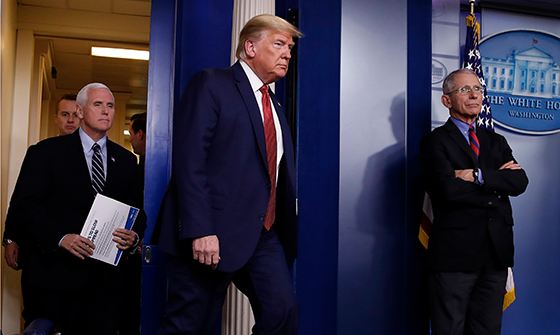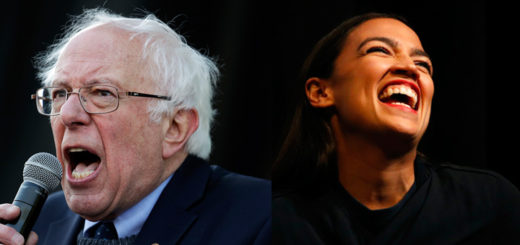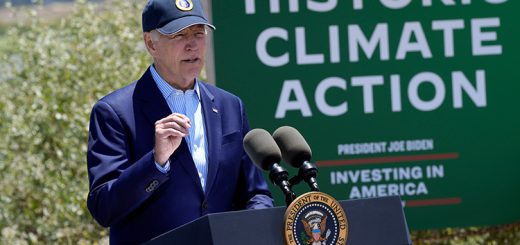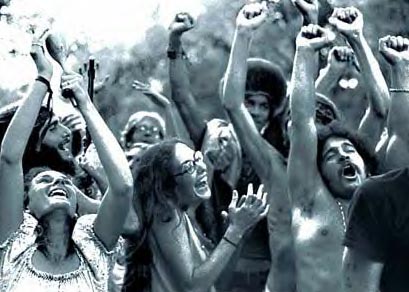Everything comes at a price.
“Everything comes at a price.”
My wife is sick to death of hearing me say it. I say it whenever either of us is confronted with one of life’s “what to do next” decisions. I have raised two daughters on the phrase. They hate hearing it, too.
The phrase rankles because it flies in the face of our desire for life to be easy. It’s not. Whenever an important decision has to be made, there is seldom a cost-free, risk-free course of action available.
So it is with respect to the administration’s response to the coronavirus outbreak. Appropriate policy occupies some hard-to-determine spot on a continuum between extremes of taking no special action whatsoever, or shutting down all industry, commerce and interpersonal transactions. Business as usual on the one hand, total stop on the other.
There is still much to be learned about the COVID-19 virus. But one thing has been clearly established. This virus spreads with unusual ease. You can be around someone who has a cold and not catch a cold yourself. But if you’re not vaccinated and have even tangential contact with someone who is infected with the measles, you, too, will soon have the measles. COVID-19 is apparently closer to the measles than a cold.
An all-new, highly contagious infectious disease is scary. Doing nothing from a policy standpoint, and simply allowing the disease to run its natural course, would likely come at a terrible price.
But so, too, will draconian measures that have the effect of shutting down the American economy. On Thursday morning, the Labor Department informed us that 3.28 million people filed first-time unemployment claims in the past week. That’s twice what experts predicted and nearly five times the previous record set in March 2009 in the wake of the financial meltdown.
“Shelter in place” orders and the shutting down of movie theaters, restaurants, bars, sporting events and “non-essential” businesses may slow the spread of COVID-19. But doing so comes at a price – a huge one. COVID-19 has its pathology. But so does unemployment. So does bankruptcy.
I heard one TV talking head say, “We can’t have an economy if we don’t have health care.” True enough. But it is equally true that we can’t have health care if we don’t have an economy.
Donald Trump is being viciously criticized in some quarters for having said he’d like to begin restarting the economy by Easter. Maybe that is ambitious. Maybe not. But I nevertheless like the thinking. He’s right. We can’t let the cure be worse than the problem.
Thousands die every year in auto accidents. If we enacted a national speed limit of 30 mph and then vigorously enforced it, traffic deaths would plummet. But our economy can’t function at 30 mph so we tacitly accept thousands of auto fatalities.
Which leads to two unavoidable conclusions regarding this crisis. There are serious risks attendant to any course of action.
And everything comes at a price.









Everything does come at a price, but if there can be a staged and data driven return to business, maybe the price of the cure will not destroy our economy. Now, in a little different context. If there is any justice, the price for the NDP (New Democratic Party) in the House of Representatives delaying and perverting the aid package will be very costly in November. Just when you think that those bottom feeders have reached the bottom, they sink even lower. I do not know how any sane person, no matter which party, can defend this attempt to include such completely unrelated costs to such a critical piece of legislation. This social engineering that is holding up needed aid for our workers and our economy is even beyond what we would expect from the Democrats, and of course, could never be passed without holding the legislation hostage. Yes, I too am familiar with the advice that everything comes at a price, but my parents also reminded me that when my behavior is selfish and dangerous, I would pay the price!
Awaiting those checks, we hear notably less squawking about “socialism.”
Maybe Uncle Sam’s not such a bad guy after all.
Sad to say, you are correct. It IS socialism and, in the end, this deep dive into that pool will prove costly.
And just to be clear, it’s NOT Uncle Sam. Uncle Sam has no money of his own. Every dime he spends, gives away or outright wastes comes out of the pockets of people who, while in the process of making the economy work, suffer the confiscation of their earnings via taxation.
Uncle Sam is being generous with OTHER PEOPLE’S MONEY.
It’s NOT “other people’s money.”
It’s OUR money.
And in this time of need, it shouldn’t be given-back-to-us based on how well Trump likes any of the governors who are actually out there governing:
https://www.vox.com/2020/3/25/21193803/trump-to-governors-coronavirus-help-ventilators-cuomo
The collectivist strikes again! “It’s OUR money”.
Translation:
What’s yours is mine and it is my decision to take yours, if I need it, since it all belongs to all of us, anyway. I’m not really taking from you since it ultimately belongs to all of us because “it’s OUR money”. Why didn’t I think of that. This means that my labor and breath to create wealth belongs to ALL OF US. We work as a colony of ants to benefit one another – natures way of survival and “justice for all”. How wonderful!
No, it’s not OUR money. WE do not live in a collectivized economy (at least not yet). Joe the Plumber’s money is Joe the Plumber’s money. WE do not have the presumptive right to take it from him.
If sweet old Widow Johnson on the corner gets too old to take care of her lawn, your neighbors might think it a good idea to take care of her lawn for her. But that doesn’t give them the right to come into your garage and just take your lawn mower and your edger. You might be inclined to say “yes” if they ask. But you’d be righteously indignant if they just let themselves in and took it.
Certainly, Joe, being the decent man that he his, won’t unreasonably object to the taxation necessary upon him to meet the legitimate needs of the country in which he lives. In that regard, Joe’s government governs “with the consent of the governed.”
But you didn’t give credit to Joe the Plumber in your comment. You credited “Uncle Sam.” I again remind you that Uncle Sam has no money of his own.
Semantics matter here. When Congress “appropriates” $2.2 trillion to pass out to individuals and companies, it is of utmost importance that the American people have a clear understanding of from whence it comes — which is to say, NOT from Uncle Sam. If Uncle Sam wants to put $2.2 trillion into the economy, he must first take it out of the economy. I put “appropriate” in quotes because, in order to be entirely correct, you can’t say that the money was appropriated. One cannot appropriate that which does not exist.
“Uncle Sam’s” largesse will be funded via borrowing — which in the case of government is simply deferred taxation.
I might can be persuaded that such a drastic measure is necessary. The operative word is “might.” But I will not dismiss the enormous implications attendant thereto by breezily saying, “Maybe Uncle Sam’s not such a bad guy after all.”
Please don’t forget the Fed is chipping 4 trillion. Cannot wrap my head around that kind of number. 6.2 Trillion total. WOW!
Keep it up Paul. You Tell Me Texas is great!
TANSTAAFL:
There Ain’t No Such Thing As A Free Lunch!
If you want the government to do something for you, it will either take your money to do it or it will take someone else’s. Which makes you either a FOOL, or a THIEF!
Hobson’s Choice, or worse Sophie’s Choice.
Not sure I understand completely the difference between the epidemics of the Avian, Swine, and H1N1 flu, MERS, SARS versus Covid19 in completely shutting down basically everything. Were not these others unknowns at the time? Or was it because they were not as contagious as this novel virus? Part of me says go back to work to save the economy which is about (if not now) teetering on the brink. Least we forget it IS time to farm and grow food. Now is prime time for real estate sales; at least it was time. Now is the time for many high school championships that were to be played (basketball, tennis, baseball, golf to name a few) and college scholarships earned. Proms, graduations (florist gearing up for these), vacations to be planned, Easter celebrations with family and friends and Church services. What are we missing here? We have basically cancelled LIFE! Is this worth it? I am not so sure and I certainly do not like the direction we are going; but. Just how many people can this disease infect and the consequences of mass infections (see Italy). Man O Man, we are truly living in a bad Science Fiction movie. No matter what the government does or the decisions our President makes; the ripple effects are rhetorical. Can YOU imagine having to make these decisions? Pray for and support our President no matter your stripes. Be patient with all our neighbors and those you encounter at the stores. Fear is the enemy now. As much as all of us hear this; we are all in this together, like it or not. We all have different talents (mine is catching fish and harvesting game), time to start planning on using yours and mine. We will know over the next few weeks whether we sink or swim as a Nation and community.
Paul and Ron, there is no longer any doubt in my mind that the former Democrat Party (in name only) is now, in fact, a 21st century version of the Communist Party but without the Guns at this point. There is also no doubt that if they were in total control of the Federal Government during this COVID-19 virus crisis that the borders would be open, the States would be effectively dissolved, martial law would be declared (eradicating the Constitution and private property) and the North American Communist Peoples Party (NACPP) would become the Left-wing dictatorship of this part of North America in which a tyrannical government would become the Law of the Land, therefore implementing the tactical doctrine to “Never let a crisis go to waste”. This would insure that they would rule us as a herd of cattle (as the Soviets ruled Russia 100 years ago), in which their lust for power would never be threatened again.
They have already shown us their agenda in the current Democrat campaign and in the negotiations for the 2-6 trillion virus mitigation bill that just passed Congress in which the Democrats tried to embed their radical Left-wing agenda. Their agenda had nothing to do with solving the pandemic and helping the distressed and suffering American people and everything to do with political maneuvering in favor of their Communist wish list no matter the additional delay and damage it would cause to our Nation.
The so-called “Main Stream Media” has acted like an inquisition prosecutor in every Trump Coronavirus Task Force news conference. Their vile hatred of Trump and their misleading and loaded questions are designed to sow seeds of disharmony and distrust in the brilliant activity of Trump and his experts to lead the Nation to a expeditious solution as his team continues to fight this pandemic.
I suggest that Trump divide the formal new conferences into two sessions. The first session would be the Fake News Leftist Media (Democrat stenographers) that can’t help but show their childish, ignorant, temperamental, vicious, and agenda driven behavior. Not only does the Left deliberately lie and mislead but they also IGNORE facts that should be revealed because their false agenda would otherwise be damaged and exposed as pure Leftist propaganda. The second session would be populated with genuine journalists that exhibit professional inquiries into the key subjects of the day with the intent to educate the American population and report the facts without any agenda at all. The contrast between the two sessions would be an exquisite education into the reality of fake vs. true journalism (free of politics).
By way of this contrast, Trump has the power to expose these enemies of the American way of life. In addition he can emphasize our National heritage based on the historical greatness of being founded on the Constitution and the God given Rights of Man in which a Truthful Free Press is fundamental to our protection of this heritage by giving the American people access to reality, not lies, in order to further reinforce their faith in our system. The high Cost of continued freedom depends on the PRICE we are willing to pay to expose the LIES while proclaiming the TRUTH, no matter the damnation and defamation the Left tries to send our way with impunity, given their overwhelming penetration of media, government, and academia in general.
I have really enjoyed reading these excellent, well-considered opinions that could vastly improve the knowledge of some of many so-called journalists! I am amused by the post that linked to a Vox article discussing how Trump is unfairly distributing aid, especially ventilators to New York. As you would expect, it was long on criticism of Trump, but short on the reality that there were thousands of ventilators that had been sent and were in storage. Too bad the article did not point out that the brilliant Governor was complaining about needing something that had already been furnished. I am not surprised that a left wing publication like Vox would print such garbage, but I must say that it was a little unexpected to see that an intelligent person would use it to support his argument. By the way, maybe I missed it, but did anyone see a defense of the Democrat attempt to load this critical piece of legislation with unrelated leftist dreams? Possibly those actions reeked even too much for any sane person to try to defend? I am guessing that since the virus does not seem to adversely affect the youth, it was necessary to attach more funding for Planned Parenthood to correct that obvious discrimination. Could this be a defense? I am still waiting.
On March 16, some Facebook friends were skeptical when I posted: “We are accustomed to seeing healthcare workers dressed in white. In two weeks we’ll be seeing them in military camouflage.”
One friend wagered me a lobster at an expensive restaurant that I was wrong. ONE week later, our president settled the bet, deploying troops in pop-up M*A*S*H hospital tents in (then) 3 states.
Since, the Javits Center has transformed into a thousand bed triage. Lacking PPE, healthcare workers are wearing trash bags. They work exhaustive shifts alongside uniformed troops.
Texans: Look-up the online pandemic heat map, then do the math. Seattle was 11 days behind Italy. +10 days = NYC.
If you’re reading this on your smartphone, open the Calendar app and set two reminders:
1. 10 days from today. We can reconvene here and continue aruguing about “the Democrat’ Party;” after prominent members of “the Republic’ Party” compared “the common cold” to a virus which knows no politics. They assured us it would “disappear, like it’s a miracle” when the weather warmed-up. In 10 days, it’ll be warmer.
2. Second Calendar timer: Easter Sunday. Which crowded church are YOU in? Possibly the same pew as the pious Mr. Trump? Answer aloud unless you’re intubated.
And we’ll take that lobster to-go.
The Trump Derangement Syndrome (TDS) seems to have no cure no matter how much contrary information is presented to its victims. It reminds me of the movie, “Invasion of the Body Snatchers” in which the transformation from humanity to robotic behavior is complete. No amount of reality or rational and objective thought can penetrate this shell of hatred. I did not know that TDS could plumb the depths of verbal revenge in the presence of a brand new virus that is so well hidden that the entire Free World was fooled as to its virulent qualities (except for China that mislead us from the beginning). And yet, Trump and the “Republic Party” are clearly to blame. We would all be better off by arguing with a fence post. Did we hear of the Obama debacle and the thousands of deaths BEFORE this god of the Democrats decided to take action 6 months too late on the 2009 H1N1 virus when there was no vaccine available at the time? Give me a break!
Ya didn’t get the memo?
The Dear Leader has now acknowledged the pandemic.
Cultists: snap-to-attention!
Paraphrasing the daily briefing rally: “Hanba habba habba…”
#NoLongerAhoax
It challenges the logical thinker to get coherence from the “Biden-like” posts from our resident leftist. I think Solomon is being too generous, as a fence post might make more sense. Like any good leftist, he is a wizard at avoiding uncomfortable realities, and shifting the blame. The whining and droning New York governor has much the same malady. Even though our Federalist system places the governor at the front line in such emergencies, he is very adept at blaming others for his incompetence. The governor is the one responsible for preparedness for his state; however, he chooses to spend needed resources on failed solar and light bulb companies. If you want to hear “Hanba habba habba”, tune into one of Cuomo’s press conferences. To defend his very harsh criticism of the DESPERATE lack of ventilators (which HE should have purchased), but were already in a warehouse provided by the Trump administration, the genius explains to a receptive press that this is what stockpiling is all about? I am still waiting for a reply as to why the Democrat leadership would delay the critical aid package by inserting unrelated funding. I do not understand how using this vehicle to attempt to fund leftist causes in a time of emergency is justified, but I am willing to try. But please……no “Hanba habba habba?
FEMA sent FIFTY THREE large refrigerated trucks to New York, as makeshift morgues where bodies are being stacked, and you soreheads want to argue about politics?
Fine, “it’s a hoax.”
“It’s the common cold.”
It is a truism, Ron, that when you activate the “flak”, you are directly over the target. Bombs away! Thanks for your expanded explanation of the Body Snatcher’s escape from coherent logic – “avoiding uncomfortable realities, and shifting the blame”.